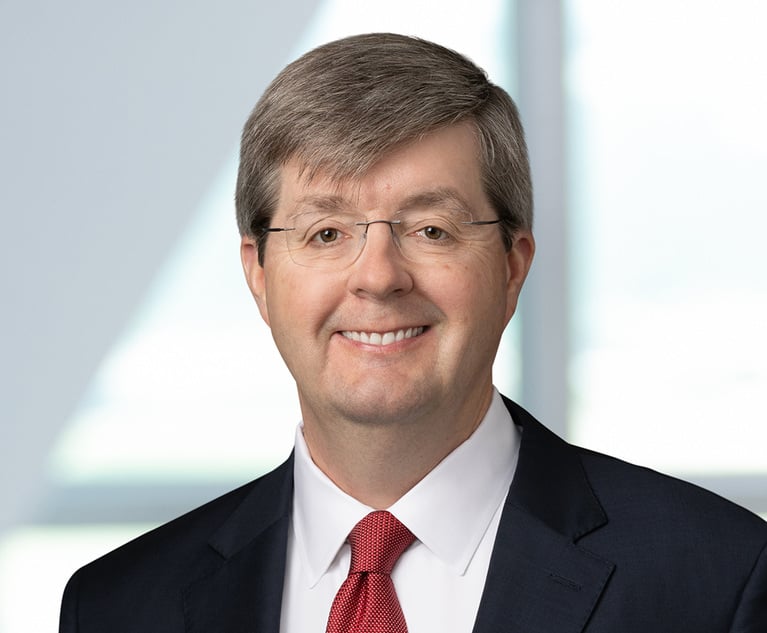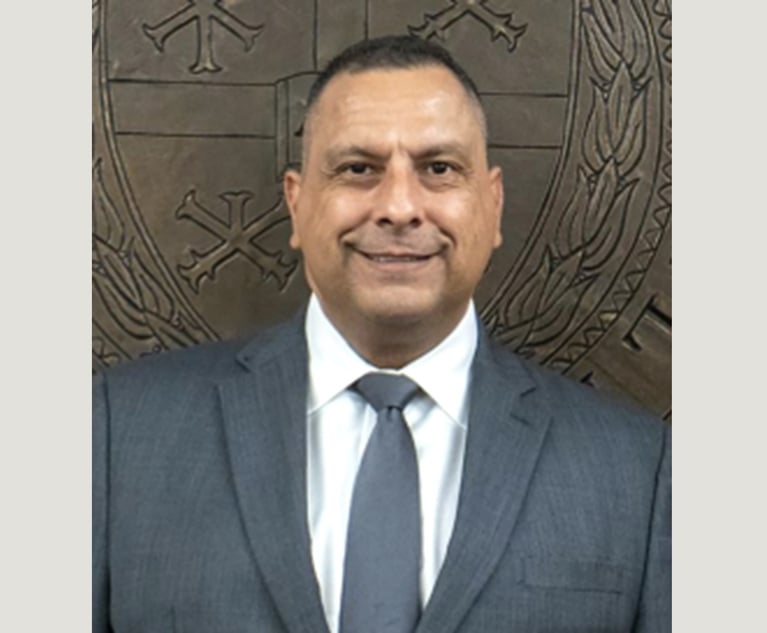VirnetX Scores $502.5M Verdict Against Apple
It's the second nine-figure verdict obtained by the company and its Caldwell Cassady & Curry lawyers in the last year. But Apple says the PTAB has already invalidated all of the patents.
April 12, 2018 at 07:19 PM
4 minute read

Juries love VirnetX Inc. patents. The Patent Trial and Appeal Board, not so much.
When the U.S. Court of Appeals for the Federal Circuit chooses which is correct, the decision could be worth more than $1 billion.
Publicly traded IP company VirnetX added to a string of nine-figure verdicts against Apple Inc. in the Eastern District of Texas on Tuesday, this time scoring $502.5 million in its long-running dispute with Apple Inc. Jurors found that Apple willfully infringed four VirnetX patents with redesigned versions of its FaceTime and VPN on Demand applications.
The big trial win goes to Caldwell Cassady & Curry. Partners Bradley Caldwell, Jason Cassady and Austin Curry tried the case with T. John “Johnny” Ward Jr. of Ward, Smith & Hill. Apple was represented by Kirkland & Ellis and Desmarais.
Last year another jury found that previous versions of the same applications infringed the same VirnetX patents, awarding $302 million. With enhanced damages for willfulness, the judgment was bumped up to $440 million.
VirnetX also won a $368 million verdict in 2012, but the Federal Circuit undid that award primarily due to faulty damages calculations.
VirnetX was founded by engineers and executives from Science Applications International Corp. The patents describe methods for more easily securing mobile communications.
Apple told the Federal Circuit last month that the PTAB has invalidated every asserted claim of the four VirnetX patents at issue in the trials. The PTAB invalidations have come in a lengthy series of inter partes review and re-examination proceedings, some brought by Apple and some by other parties. If the PTAB rulings stand, VirnetX can't recover a nickel, Apple argues in a brief signed by Wilmer Cutler Pickering Hale and Dorr partner William Lee.
VirnetX, which is represented by Paul Hastings in the PTAB appeals, argues that not only are the PTAB decisions wrong, they shouldn't have been issued in the first place.
Once the Federal Circuit affirmed the validity of VirnetX's patents following the first trial, the PTAB proceedings should have come to an end, Paul Hastings partner Naveen Modi argues in one of VirnetX's appellate briefs.
In a separate appeal, Modi argues that Apple should have been time-barred from petitioning for inter partes review. The PTAB originally rejected an Apple petition as untimely, then rejected a similar petition from RPX Corp., finding that Apple was trying to use RPX as a proxy to get around the time bar.
A company called The Mangrove Partners Master Fund Ltd. then brought an IPR petition. VirnetX complained that the Mangrove fund was another proxy for Apple or RPX, a notion that Mangrove lawyers dismissed in PTAB papers as “speculative—bordering on paranoid.”
A few months later the related entity Mangrove Partners became a 5 percent shareholder of RPX and placed three directors on its board. Nevertheless, the PTAB allowed the Mangrove Partners Master Fund petition to go forward, and for Apple to join it.
“Mangrove failed to identify all the real parties-in-interest—and did so intentionally,” Modi argues in an April 2 brief to the Federal Circuit.
Federal Circuit case law previously prevented the court from reviewing PTAB decisions on real parties and time bars. But the court overruled that case law in January. In a recent hearing involving RPX, some judges indicated they might impose a higher standard than the PTAB has.
This content has been archived. It is available through our partners, LexisNexis® and Bloomberg Law.
To view this content, please continue to their sites.
Not a Lexis Subscriber?
Subscribe Now
Not a Bloomberg Law Subscriber?
Subscribe Now
NOT FOR REPRINT
© 2025 ALM Global, LLC, All Rights Reserved. Request academic re-use from www.copyright.com. All other uses, submit a request to [email protected]. For more information visit Asset & Logo Licensing.
You Might Like
View All
Bracewell Adds Former Pioneer Natural Resources Lawyer to O&G, Energy Transition Practices
2 minute read

Special Counsel Jack Smith Prepares Final Report as Trump Opposes Its Release
4 minute readTrending Stories
Who Got The Work
Michael G. Bongiorno, Andrew Scott Dulberg and Elizabeth E. Driscoll from Wilmer Cutler Pickering Hale and Dorr have stepped in to represent Symbotic Inc., an A.I.-enabled technology platform that focuses on increasing supply chain efficiency, and other defendants in a pending shareholder derivative lawsuit. The case, filed Oct. 2 in Massachusetts District Court by the Brown Law Firm on behalf of Stephen Austen, accuses certain officers and directors of misleading investors in regard to Symbotic's potential for margin growth by failing to disclose that the company was not equipped to timely deploy its systems or manage expenses through project delays. The case, assigned to U.S. District Judge Nathaniel M. Gorton, is 1:24-cv-12522, Austen v. Cohen et al.
Who Got The Work
Edmund Polubinski and Marie Killmond of Davis Polk & Wardwell have entered appearances for data platform software development company MongoDB and other defendants in a pending shareholder derivative lawsuit. The action, filed Oct. 7 in New York Southern District Court by the Brown Law Firm, accuses the company's directors and/or officers of falsely expressing confidence in the company’s restructuring of its sales incentive plan and downplaying the severity of decreases in its upfront commitments. The case is 1:24-cv-07594, Roy v. Ittycheria et al.
Who Got The Work
Amy O. Bruchs and Kurt F. Ellison of Michael Best & Friedrich have entered appearances for Epic Systems Corp. in a pending employment discrimination lawsuit. The suit was filed Sept. 7 in Wisconsin Western District Court by Levine Eisberner LLC and Siri & Glimstad on behalf of a project manager who claims that he was wrongfully terminated after applying for a religious exemption to the defendant's COVID-19 vaccine mandate. The case, assigned to U.S. Magistrate Judge Anita Marie Boor, is 3:24-cv-00630, Secker, Nathan v. Epic Systems Corporation.
Who Got The Work
David X. Sullivan, Thomas J. Finn and Gregory A. Hall from McCarter & English have entered appearances for Sunrun Installation Services in a pending civil rights lawsuit. The complaint was filed Sept. 4 in Connecticut District Court by attorney Robert M. Berke on behalf of former employee George Edward Steins, who was arrested and charged with employing an unregistered home improvement salesperson. The complaint alleges that had Sunrun informed the Connecticut Department of Consumer Protection that the plaintiff's employment had ended in 2017 and that he no longer held Sunrun's home improvement contractor license, he would not have been hit with charges, which were dismissed in May 2024. The case, assigned to U.S. District Judge Jeffrey A. Meyer, is 3:24-cv-01423, Steins v. Sunrun, Inc. et al.
Who Got The Work
Greenberg Traurig shareholder Joshua L. Raskin has entered an appearance for boohoo.com UK Ltd. in a pending patent infringement lawsuit. The suit, filed Sept. 3 in Texas Eastern District Court by Rozier Hardt McDonough on behalf of Alto Dynamics, asserts five patents related to an online shopping platform. The case, assigned to U.S. District Judge Rodney Gilstrap, is 2:24-cv-00719, Alto Dynamics, LLC v. boohoo.com UK Limited.
Featured Firms
Law Offices of Gary Martin Hays & Associates, P.C.
(470) 294-1674
Law Offices of Mark E. Salomone
(857) 444-6468
Smith & Hassler
(713) 739-1250







